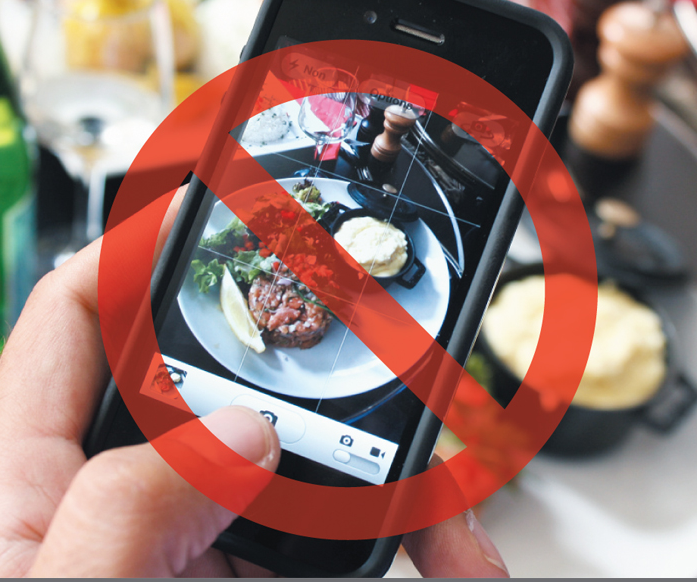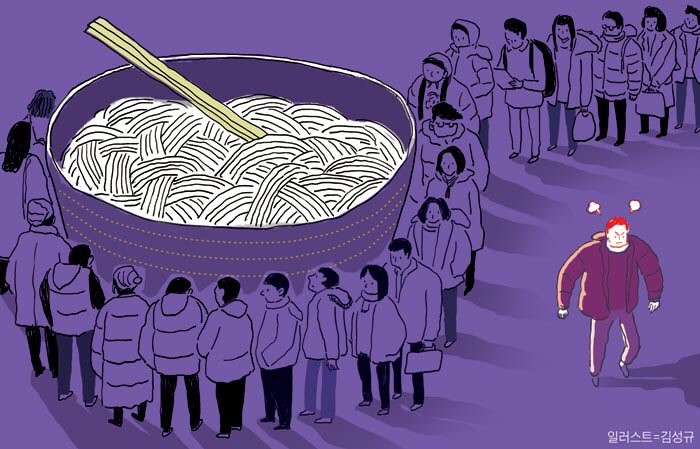 |
| ▲ More and more restaurants are denying a customer’s shooting.(Picture from chosun.com) |
Many students would have heard of the expression “hot place" and may have even been to at least one. "Hot places" are popular locations where many people gather. With the development of social networking services (SNS), the number of places deemed “hot” has increased a lot and the types are also becoming more and more diverse. Typically, hot places in Seoul include Iksun-dong, Gyeongridan-gil, Yeonnam-dong and Garosu-gil and so on. So, why do people want to go to these hot places? First, everyone is curious about popular places and as a result and wants to experience them for themselves. There are also people who go only to take pictures so they can hashtag the location when posting to their SNS. However, there is a growing wave of support for a new social trend, where the more a place is mentioned on SNS, the more people go out of their way to avoid it, looking instead for locations nobody is talking about.
What can be called the “anti-hotspot syndrome" is an emerging social trend where consumers avoid areas and businesses made famous through SNS and instead seek to spend their money in locations that remain untouched by a social media buzz. This trend was triggered in January 2018 from a ban on social media influencers by a hotel in Dublin, Ireland. The hotel initiated the ban after they received a request from a vlogger asking for a free five-night stay at their hotel in exchange for positive coverage of their visit. The hotel refused the offer and posted the exchange to their Facebook page resulting in a huge backlash against the popular vlogger and others like her. Soon the trend spread beyond Ireland to the rest of the world. For example, world-famous restaurants such as Britain's "Waterside Inn", Japan's "Asahi Bunn", and New York's "Momopucuko” banned customers from taking pictures. The owners argued that you can’t concentrate on your food while taking pictures and it disturbs other customers around you. Some countries have legally guaranteed copyrights on food, so if you take photos of the food without permission, you could be punished for copyright infringement. In other words, these countries consider food and even their interior design, as the legal property of the creator.
So why is this anti-hotspot phenomenon on the rise? What is it making people reject so-called ‘hot places’? We can answer this from two perspectives. First, there is the customer’s position. According to a YTN radio show interview with culture critic Jung Ji Woo, people are getting tired of keeping up with the latest hot places. The fundamental reason why people started to look for new places was a desire to go somewhere different and unique that others don’t know about, but when people find out about these exclusive spots, they become too popular and regulars feel like they have lost their space to the unappreciative masses. “People also feel too much commercial viability from the SNS promotions. “When people visit these hot places promoted by social media, they are disappointed because they are so uniform and similar”, said Mr. Jung. And if a hot place is located too close to another, for example on the same avenue, then the street gets dirty easily due to the volume of trash people create as they stroll through. In contrast, the shopkeeper has a different perspective. The gentrification of a neighborhood affects the bottom line of shopkeepers. Mr. Jung pointed out that the gentrification phenomenon is related to the ‘anti-hotspot syndrome’. While its origins are from housing matters, where natives who live in a lagged residential area are expelled from their homes due to soaring house prices because of an inflow of middle-class residents, this phenomenon effectively explains the shopkeepers perspective for supporting the anti-hotspot syndrome’. Because of the exploding increase in the number of visitors, shop rents rapidly increase leaving shopkeepers with no choice but to close up, as they cannot keep up with the rising rentals costs. The logic for the landlord is clear if the shop is prosperous, and the whole street is coming alive, then building owners will naturally raise their rent. However, the fame created by an SNS promotion is short-lived and after it expires, as the number of visitors grows less and less, shopkeepers still have to worry about paying the high rent fees and without persistent traffic, they eventually have to give up their businesses. ‘So, because of this gentrification phenomenon, more and more shopkeepers are deciding to ban visitors’ promotion of their shops online’, said Mr. Jung.
 |
| ▲ Some people are now refusing hot places because they want to know those places only themselves.(Picture from chosun.com) |
In accordance with this trend, there are growing numbers of restaurants in Korea refusing to be made famous in many ways. For example, a Japanese restaurant in Donggyo-dong, Seoul, and a restaurant in Cheongju posted the phrase "No photos and no mobile phones” on the walls of their facilities. Customers can't take pictures without the owner's permission. Lastly, visitors to the "N Restaurant" in Seoul only know about because they promote it on their own portal website.
As such, many stores are making great efforts to keep their businesses from becoming famous. Does this mean people will stop promoting products just because many businesses are against this form of marketing? Definitely not. SNS influencers or bloggers want to let people know even if a store practices low coverage marketing. They do so by using certain hashtags when uploading their photos to SNS. Any posts from the spots are accompanied by the hashtag "#NotGonnaTellU #MySecret #Guilty Pleasure," which doesn't reveal the name of the store or what kind of store it is but promotes it just the same. The ‘anti-hotspot syndrome’ is a brand-new form of trend-bucking. By not following trends and putting an end to the search for the latest hotspots, people are defining their own individuality and developing a personality that suits them alone. Simply following what’s hot can certainly cause shops to flourish during the short period, but conversely, it can adversely affect them in the long run.
This trend is not just about marketing in stores, but about avoiding so-called “hot” places. And this “anti-hotspot syndrome” is not just an avoidance of hot places, but a widespread belief that our own consumption should reflect ourselves and not the desires of the masses In line with this trend, many stores have joined the movement. It seems paradoxical to refuse to be famous, but this is a trend made inevitable by the success of our own society.
김동은, 박근후 dankookherald@gmail.com

 Vote for the Campus Brand Naming!
Vote for the Campus Brand Naming!

![[Campus Magnifier] Let's Surf the Library!](/news/thumbnail/202404/12496_1765_4143_v150.jpg)




